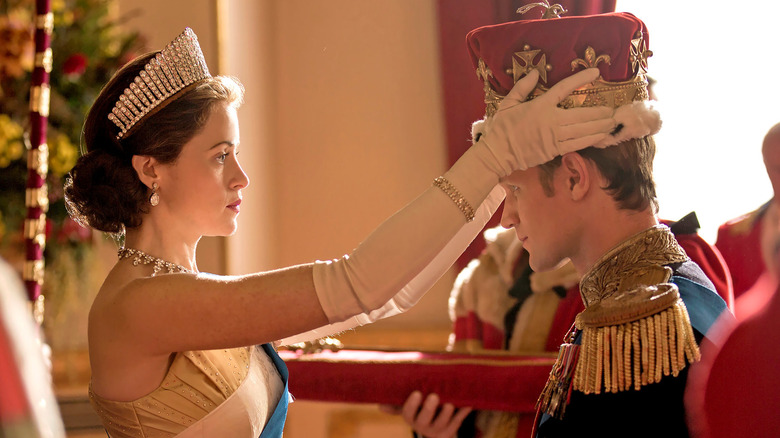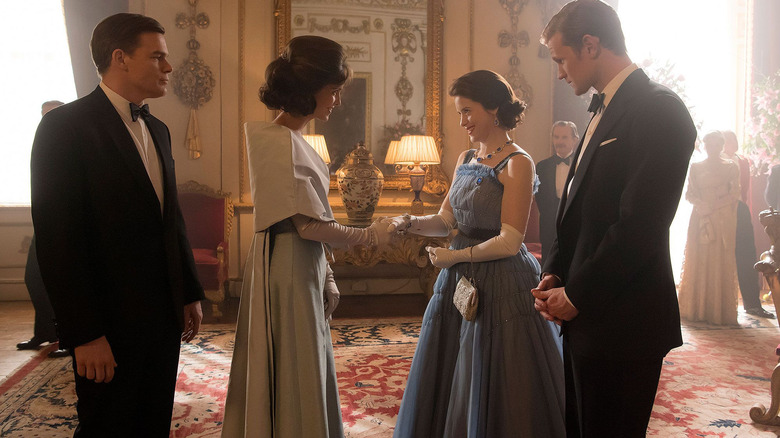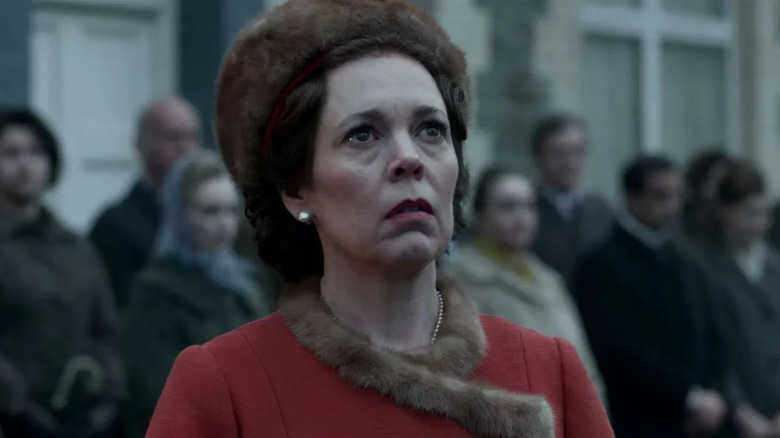The Hardest Part Of Writing The Crown Is Deciding What To Leave Out
Netflix's hit historical drama "The Crown" moves along so seamlessly that it's easy to breeze right through four seasons of royal scandals and political intrigue without processing the series' biggest accomplishment of all. I'm not talking about all the stunning recreations, the pitch-perfect casting, or even the razor-sharp writing (though all of the above deserve a round of applause). I'm talking about the sheer volume of material that this series somehow reduces down to 10-hour-long episodes of prestige TV per season.
When the series first began in 2016, it was focused on the years leading up to the reign of Queen Elizabeth II, when her uncle abdicated the throne, making her the heir apparent as her father became king. By the third episode, the young newlywed assumes her role as monarch, and from there, the first four seasons trace the next 43 years of her reign. That's a lot of material to sift through and evidently, "The Crown" has no plans to slow down.
The forthcoming fifth season is expected to cover another decade of Queen Elizabeth's life. In fact, "The Crown" was once set to end with five seasons until series creator Peter Morgan announced plans for a sixth — not to cover new ground, but to make time for material they already sketched out. Queen Elizabeth's seven decades as monarch means that there is never a shortage of material for a new season of "The Crown," so instead the issue is how much story can be fit into a single season?
As for the answer, Morgan has found a clever way to skirt past the issue of covering every single major event since 1953 — "The Crown" picks and chooses which moments to cover.
What goes into a season of The Crown?
Each season of "The Crown" spans roughly a decade's worth of history and almost every hour-long episode acts like a self-contained story. It's like a series of mini-movies about different points in time, all connected by the common thread of Queen Elizabeth's historic reign. While one episode might zero in on a specific historic event, another picks a theme and traces it over the course of months or even years. For Morgan and his team, the hardest part of putting a season together is figuring out exactly which moments in time to focus on — and which will end up on the cutting room floor.
But as difficult as the process may be, Morgan considers this to be the secret ingredient to the show's success. In a 2021 interview with The Hollywood Reporter, Morgan said:
"This is the part of the writing process that takes me the longest — working out what to leave out and what to put in. I like to think that's the magic ingredient and what defines 'The Crown.' It takes us at least nine months, outlining and outlining, before the writing of any season starts."
While major themes and the characters themselves tie the story together, each season of "The Crown" feels like its own distinct era. Within those, each episode feels like its own anecdote, zeroing in on something specific to make a grander statement about the royals. Morgan added:
"History, even recent history, is so reductive, and so many gems disappear into a black hole. No one would thank us for churning out the "greatest hits" of any decade. We have to dig deep and find the surprises, the overlooked stories, like palace break-ins, and put them alongside the iconic events — like moon landings or weddings, or elections, or assassinations."
The Crown makes the small moments matter
This self-contained story approach gives 'The Crown" a lot of leeway when it comes to shaking up the format and tone of the series. While one episode may act like a romantic melodrama, tracing the love affair between Princess Margaret and Peter Townsend, another hits us with political intrigue, focusing on the political failings of Winston Churchill. Two of the best examples of this come in the series' third and fourth seasons. In "Fagan," one of the most bizarre incidents in Queen Elizabeth's reign becomes a way of looking at Margaret Thatcher's divisiveness. An unemployed house painter named Michael Fagan breaks into Buckingham Palace, strolls into the Queen's bedroom, and has a 10-minute conversation with the monarch before he's arrested.
Another episode explores the 1966 Aberfan disaster — a catastrophic collapse that led to a landslide of coal waste crashing into a small Welsh mining village, killing 144 people. The episode focuses on Queen Elizabeth's delayed response to the incident, but more importantly, dramatizes a historical tragedy that was probably new to a large portion of the series' audience. It remains one of the most acclaimed episodes and a perfect example of how "The Crown" uses that self-contained storytelling to its advantage.
Neither incident is the first thing you think of when it comes to significant events in Queen Elizabeth's reign, but "The Crown" finds a way to shine a light on lesser-known stories while connecting them back to the show's overarching themes about power and change.
Season 5 of "The Crown" will debut on Netflix in November of 2022.


